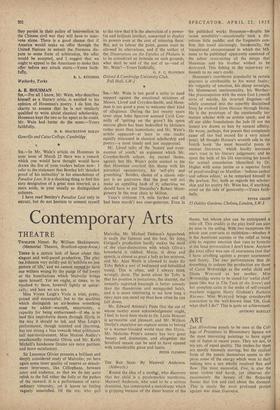SIR,—Mr. Wain is too good a critic to need support
against the emotional strictures of Messrs. Lloyd and Croyden-Smith; and Hous- man is too good a poet to welcome their kind of allegiance. During the last twenty years (ever since John Sparrow accused Cyril Con- nolly of 'spitting on the grave') his spare morose ghost has been bedevilled by idolaters rather more than iconoclasts; and Mr. Wain's article appeared—at least to one reader equally interested in classical scholarship and poetry—a most timely and just reappraisal.
Mr. Lloyd talks of the 'beauty and evan- escence of youth,' an argument which Mr. Croyden-Smith echoes. An eternal theme, agreed; but Mr. Wain's point seemed to me that Housman overlaid this theme with his parochial egocentricity, his 'self-pity and grumbling.' Besides, choice of a classic sub- ject is no guarantee that the poet will not make an appalling hash of it; otherwise we should have to put Macaulay's Robert Mont- gomery in the next chair to Milton.
Yeats's criticism ('A mile further and all had been marsh') was over-generous. Even in the published works Housman—despite his 'acute sensibility'—occasionally took a dis- astrous little paddle; and the fragments con- firm this trend alarmingly. Incidentally, the 'exceptional circumstances in which the MS. came to be published' apparently consisted of the editor resurrecting all the scraps that Housman and his brother wished to be destroyed. This fishing in the reject-tray re- dounds to no one's credit.
Housman's overblown popularity in certain quarters is attributable to his worst faults: his vulgarity of emotion, his cheap nostalgia, his Mummerset sentimentality, his Werther- like preoccupation with the more East Lynnish sorts of suicide, his inverted Jingoism—all safely crammed into the superbly disciplined form he evolved from Horace through Heine. He is the prototype of the emotionally im- mature scholar with an artistic spark; and in all our older foundations the lads (if not the lasses) are drawn to him by natural affinity. He wrote, perhaps, five poems that completely came off (no bad record for a very minor poet); ha thought Horace's seventh ode in the fottrth book 'the most beautiful poem in ancient literature,' which hardly increases one's trust in his literary judgement; and he spent the bulk of his life exercising his knack for textual emendation (described by Dr. Highet with some justice as a superior form of proof-reading) on Manilius: 'tedious author and odious editor.' as he remarked himself in the preface. No; both as regards his scholar- ship and his poetry Mr. Wain has, if anything, erred on the side of generosity.—Yours faith- fully,
PETER GREEN 55 Oakley Gardens, Chelsea„,London, S.W .3










































 Previous page
Previous page